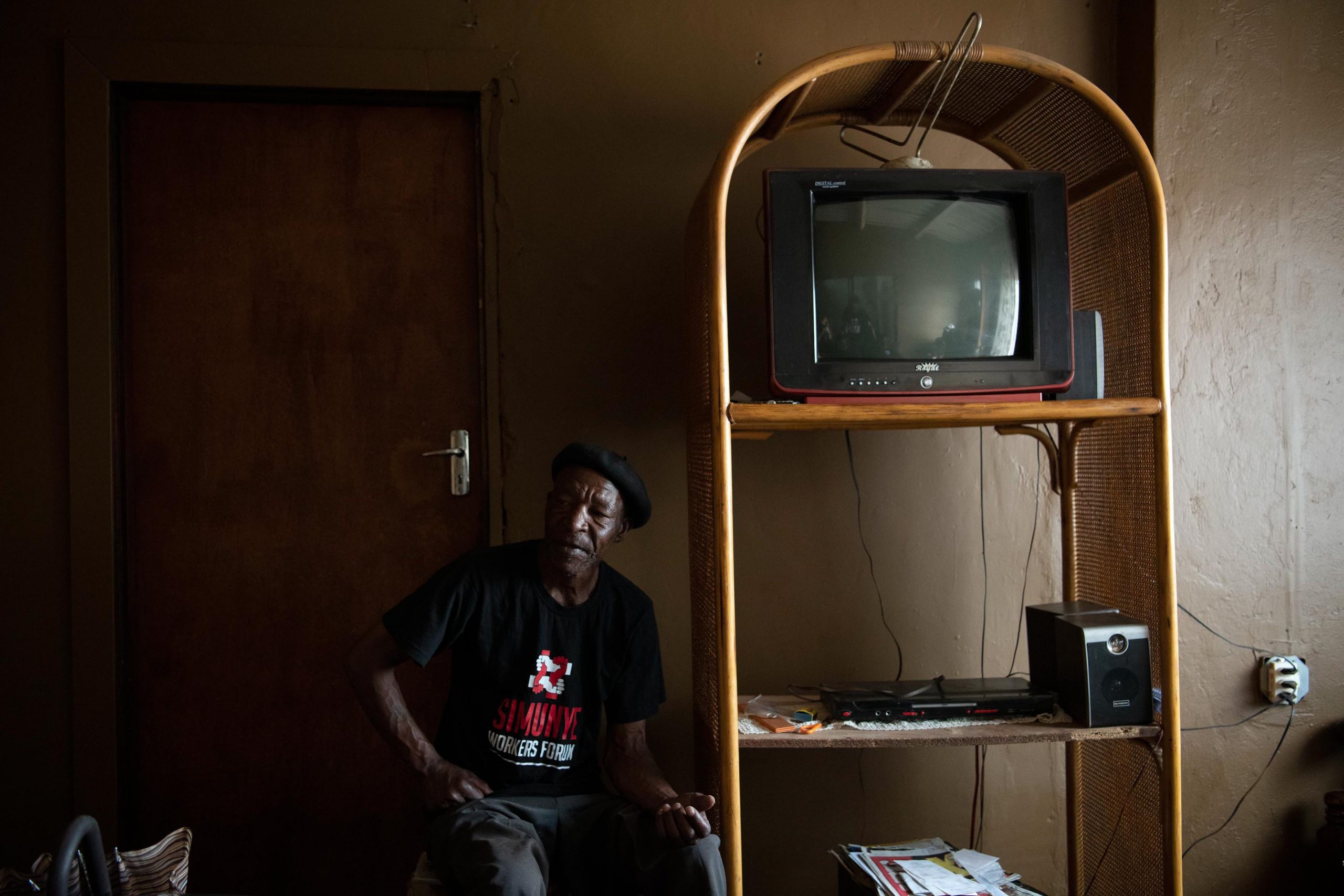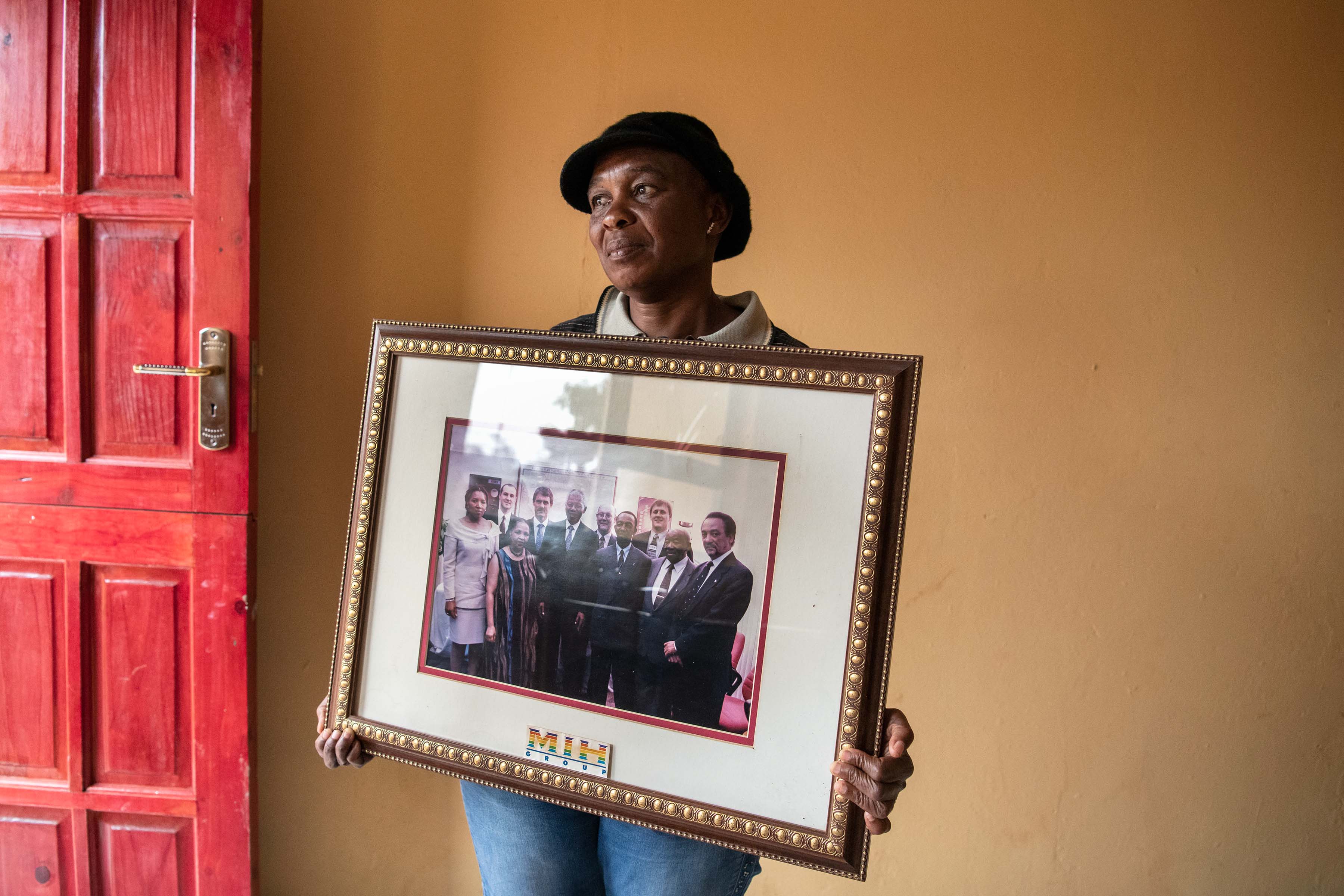The soundtrack to a working life
The Kellogg’s factory in Springs has a rich and radical musical history. Some of the workers recently dismissed from the plant are keeping that legacy alive.
Author:
12 February 2019

On 23 January, American cereal behemoth Kellogg’s retrenched 60-year-old Stephen Mwelase and nine of his colleagues ‘owing to operational requirements’.
Since his retrenchment, Mwelase has been spending more time at his sparsely furnished and provisioned home in KwaThema on Gauteng’s east rand. His dusty garden is as spare, but for a handful of pruned rose bushes.
In spite of the scarcity, both garden and home are often full of sound. When New Frame visited Mwelase, full-bodied jazz standards streamed from his DVD player.
An early musical education
Mwelase began working as a “van boy” at Kellogg’s in 1979. He and a colleague accompanied the truck drivers, delivering boxes of cereal to supermarkets around Gauteng, a function since made redundant by the factory’s modernisation.
He has outlived many of his inaugural duties at the plant. The packing of cases (filling boxes with Corn Flakes, among other things) that he did after his time in the delivery trucks, for instance, has since been automated. “The case packer was you,” says Mwelase. “I was a machine myself.”
Soon after he started at Kellogg’s, Mwelase began a fine-grained musical education under the tutelage of his elder brother, who worked as a cooker at the factory for 18 years before his death.
In these early days, the music hit Mwelase like a bolt from the blue. “There comes jazz in my head!” he says with a smile.
Jazz, according to Mwelase, who leans forward to emphasise his last word, was important to workers of his generation because they were “the people who have an understanding, the people who know about life.”

Jazz, then and now
The cats now drifting harmoniously around Mwelase’s living room – bygone craftsmen of American bebop (Dizzy Gillespie, Roy Eldridge and Clark Terry) and big band (Johnny Hodges and Benny Carter) – remain his fondest.
Gwen Ansell, author of Soweto Blues: Jazz, Politics and Popular Music in South Africa, suggests that the kind of internationalism that characterises Mwelase’s tastes was important for how workers used jazz to confound the state-imposed tribal categories during apartheid.
The peculiar connections that Mwelase, who is hardly ever seen without his black woollen beret, has cultivated with popular culture in the country where Kellogg’s is headquartered go beyond bebop.
Related article:
He is nicknamed “McQueen” – after Steve (“He makes a serious, serious picture,” Mwelase says of his namesake; The Great Escape and The Getaway are still his favourite films) – in part for the rakish looks still discernible in his leathery face, but mostly for the speed with which he played soccer in his youth. Mwelase’s exploits as a creative midfielder were once celebrated in KwaThema.
He has never picked up an instrument (“I just listen and dance”), but jazz remains a treasured part of Mwelase’s life. He attends fortnightly jazz sessions around KwaThema and his burial society – the Izinduku Social Club – doubles as a jazz appreciation society. After discussing financial matters at their monthly meetings, the members of Izinduku settle down to eat, drink and debate jazz.
Now in old age, jazz is very much a nostalgic custom for Mwelase. The Izinduku meetings and KwaThema’s jazz sessions – where “I am glad to see you are still healthy” is a common refrain – offer an opportunity to check in with old comrades. The music was more political earlier in his life, says Mwelase, echoing Ansell’s suggestion that the creation and consumption of jazz during apartheid allowed space for workers’ “intellectual discourse” after the state had stamped out others, especially in townships such as KwaThema. “We understand each other when we hear that music,” he explains.

A cauldron of music and resistance
Back at the factory where he spent most of his working life, Mwelase’s enduring affair with jazz began alongside a radical musical history of a different kind.
Two years after he began his shifts as a “van boy”, the Sweet, Food and Allied Workers Union (SFAWU) won recognition as a majority union at Kellogg’s, in 1981. Part of the union’s genesis at the factory was the rise of the fabled worker choir, the K-Team.
As a result of his casual employment, Mwelase did not attend union events, where the choir shared stages with such esteemed company as Phillip Tabane and the Malombo Jazzmen. He remembers tenderly, however, how members of the choir would use moments stolen from their working day at the factory – a smoke break, a lunch break – to encourage fellow workers by crooning one of the K-team numbers.
The choir’s mzabalazo was initially composed to sidestep the suppression of information during apartheid and sustain news of workers killed or detained by the state. Among these was Chris Dlamini, whose leadership among Kellogg’s workers eventually saw him elected president of the Federation of South African Trade Unions (Fosatu) and, later, as the founding deputy president of Cosatu.
The K-team’s ouvre extended beyond the red-brick walls of the Kellogg’s plant, including a leaden, piercing eulogy to Andries Raditsela, a worker at Dunlop’s Benoni factory and a shop steward for the Fosatu-aligned Chemical Workers Industrial Union (CWIU).
On 4 May 1985, a year after he had been instrumental in organising nationwide strikes at Dunlop factories, Raditsela was picked up by the police and tortured before his unconscious body was dropped off at the CWIU offices. He died two days later. (Adriaan Vlok, then minister of law and order, later paid Raditsela’s dependants R33 000 in an out-of-court settlement.)
One of the many activists that Raditsela recruited into the labour movement was Claude Mabaso. Now 68 and living in Geluksdal on the northwestern edge of Tsakane, Mabaso worked as a clerk and CWIU mole in Dunlop’s finance department. He would pass information about the company’s profits to the union on crumpled pieces of paper hidden in novels, which he would pretend to read during his lunch hours.
Mabaso remembers Raditsela as a quiet but intelligent friend and leader. And the song that rhapsodised his life and work as a paragon of solidarity across factories and sectors, he says, characterised the workers movement of the 1970s and 1980s.
Sitting with Andrew Zulu, 78, who was Dlamini’s deputy at Fosatu, just a few roads away from a street named for Raditsela in Tsakane, Mabaso reminisces at length about the functions that songs sung by workers’ choirs like the K-team fulfilled at the time. They spread news (such as that of Dlamini’s detentions) and commemorated fallen comrades (like Raditsela), but worker choirs also kept spirits high during strikes under heavy repression (“It was difficult, we faced guns, killings!” remembers Zulu) and mobilised workers who had not yet joined the movement.

The more things stay the same
Both veteran unionists find it staggering that four decades after they helped Dlamini organise one of South Africa’s most potent industrial workers movements, their late comrade’s daughter, Mabotlhale Dlamini, 53, who worked as a machine operator at the same Kellogg’s factory as her father, is among the 10 workers the cereal giant has dismissed.
Related article:
Mabotlhale, who says she knows her father as much from legend as from personal memory, remembers him as “a hero” as well as “an innocent man, a polite man, the man who loved his family”. Her home in KwaThema is filled with ornaments from Dlamini’s time as a diplomat in Beijing (a set of wooden furniture inlaid with golden Chinese characters, delicate models of junks) and memories from his time in Parliament (a portrait of him from a state function, sitting with former president Thabo Mbeki and a group of traditional Zulu dancers).
In an interview with Power FM a week after his retrenchment, Zandile Mposelwa, Kellogg’s head of external relations, thanked Mwelase for his years of service and the contribution he made to building the company. She failed to clarify why it was within Kellogg’s operational requirements to dismiss a worker with Mwelase’s decades of experience operating and training others on much of the machinery at the company’s Springs plant.
Mwelase, Mabotlhale and their eight colleagues will dispute precisely that point on 20 February, when they seek reinstatement at the Commission for Conciliation, Mediation and Arbitration (CCMA).



